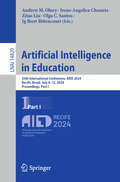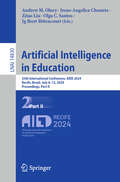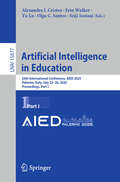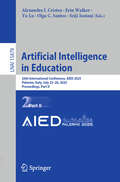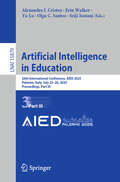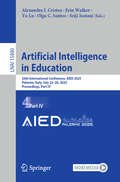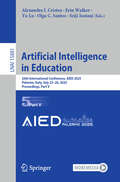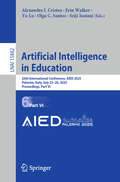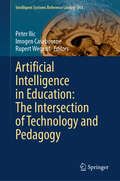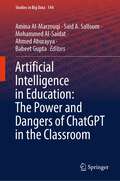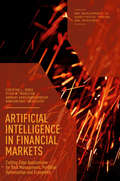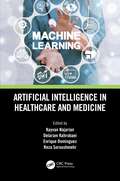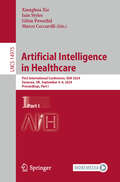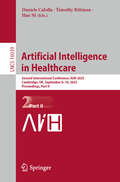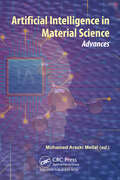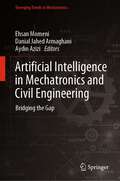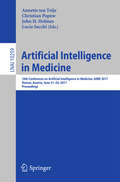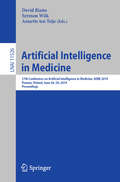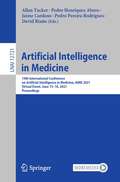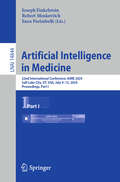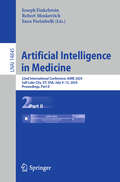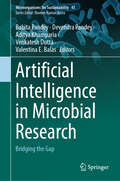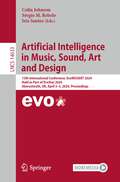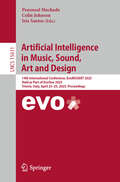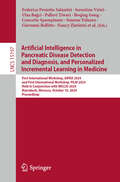- Table View
- List View
Artificial Intelligence in Education: 25th International Conference, AIED 2024, Recife, Brazil, July 8–12, 2024, Proceedings, Part I (Lecture Notes in Computer Science #14829)
by Olga C. Santos Ig Ibert Bittencourt Irene-Angelica Chounta Andrew M. Olney Zitao LiuThis book constitutes the refereed proceedings of the 25th International Conference on Artificial Intelligence in Education, AIED 2024, held in Recife, Brazil, in July 8–12, 2024, Proceedings. The 49 full papers and 27 short papers presented in this book were carefully reviewed and selected from 334 submissions. The papers present results in high-quality research on intelligent systems and the cognitive sciences for the improvement and advancement of education.
Artificial Intelligence in Education: 25th International Conference, AIED 2024, Recife, Brazil, July 8–12, 2024, Proceedings, Part II (Lecture Notes in Computer Science #14830)
by Olga C. Santos Ig Ibert Bittencourt Irene-Angelica Chounta Andrew M. Olney Zitao LiuThis book constitutes the refereed proceedings of the 25th International Conference on Artificial Intelligence in Education, AIED 2024, held in Recife, Brazil, in July 8–12, 2024, Proceedings. The 49 full papers and 27 short papers presented in this book were carefully reviewed and selected from 334 submissions. The papers present result in high-quality research on intelligent systems and the cognitive sciences for the improvement and advancement of education.
Artificial Intelligence in Education: 26th International Conference, AIED 2025, Palermo, Italy, July 22–26, 2025, Proceedings, Part I (Lecture Notes in Computer Science #15877)
by Olga C. Santos Alexandra I. Cristea Seiji Isotani Yu Lu Erin WalkerThis six-volume set LNAI 15877-15882 constitutes the refereed proceedings of the 26th International Conference on Artificial Intelligence in Education, AIED 2025, held in Palermo, Italy, during July 22–26, 2025. The 130 full papers and 129 short papers presented in this book were carefully reviewed and selected from 711 submissions. The conference program comprises seven thematic tracks:Track 1: AIED Architectures and Tools Track 2: Machine Learning and Generative AI: Emphasising datadrivenTrack 3: Learning, Teaching, and Pedagogy Track 4: Human-Centred Design and Design-Based Research Track 5: Teaching AI Track 6: Ethics, Equity, and AIED in Society Track 7: Theoretical Aspects of AIED and AI-Based Modelling forEducation
Artificial Intelligence in Education: 26th International Conference, AIED 2025, Palermo, Italy, July 22–26, 2025, Proceedings, Part II (Lecture Notes in Computer Science #15878)
by Olga C. Santos Alexandra I. Cristea Seiji Isotani Yu Lu Erin WalkerThis six-volume set LNAI 15877-15882 constitutes the refereed proceedings of the 26th International Conference on Artificial Intelligence in Education, AIED 2025, held in Palermo, Italy, during July 22–26, 2025. The 130 full papers and 129 short papers presented in this book were carefully reviewed and selected from 711 submissions. The conference program comprises seven thematic tracks:Track 1: AIED Architectures and Tools Track 2: Machine Learning and Generative AI: Emphasising datadrivenTrack 3: Learning, Teaching, and Pedagogy Track 4: Human-Centred Design and Design-Based Research Track 5: Teaching AI Track 6: Ethics, Equity, and AIED in Society Track 7: Theoretical Aspects of AIED and AI-Based Modelling forEducation
Artificial Intelligence in Education: 26th International Conference, AIED 2025, Palermo, Italy, July 22–26, 2025, Proceedings, Part III (Lecture Notes in Computer Science #15879)
by Olga C. Santos Alexandra I. Cristea Seiji Isotani Yu Lu Erin WalkerThis six-volume set LNAI 15877-15882 constitutes the refereed proceedings of the 26th International Conference on Artificial Intelligence in Education, AIED 2025, held in Palermo, Italy, during July 22–26, 2025. The 130 full papers and 129 short papers presented in this book were carefully reviewed and selected from 711 submissions. The conference program comprises seven thematic tracks:Track 1: AIED Architectures and Tools Track 2: Machine Learning and Generative AI: Emphasising datadrivenTrack 3: Learning, Teaching, and Pedagogy Track 4: Human-Centred Design and Design-Based Research Track 5: Teaching AI Track 6: Ethics, Equity, and AIED in Society Track 7: Theoretical Aspects of AIED and AI-Based Modelling forEducation
Artificial Intelligence in Education: 26th International Conference, AIED 2025, Palermo, Italy, July 22–26, 2025, Proceedings, Part IV (Lecture Notes in Computer Science #15880)
by Olga C. Santos Alexandra I. Cristea Seiji Isotani Yu Lu Erin WalkerThis six-volume set LNAI 15877-15882 constitutes the refereed proceedings of the 26th International Conference on Artificial Intelligence in Education, AIED 2025, held in Palermo, Italy, during July 22–26, 2025. The 130 full papers and 129 short papers presented in this book were carefully reviewed and selected from 711 submissions. The conference program comprises seven thematic tracks:Track 1: AIED Architectures and Tools Track 2: Machine Learning and Generative AI: Emphasising datadrivenTrack 3: Learning, Teaching, and Pedagogy Track 4: Human-Centred Design and Design-Based Research Track 5: Teaching AI Track 6: Ethics, Equity, and AIED in Society Track 7: Theoretical Aspects of AIED and AI-Based Modelling forEducation
Artificial Intelligence in Education: 26th International Conference, AIED 2025, Palermo, Italy, July 22–26, 2025, Proceedings, Part V (Lecture Notes in Computer Science #15881)
by Olga C. Santos Alexandra I. Cristea Seiji Isotani Yu Lu Erin WalkerThis six-volume set LNAI 15877-15882 constitutes the refereed proceedings of the 26th International Conference on Artificial Intelligence in Education, AIED 2025, held in Palermo, Italy, during July 22–26, 2025. The 130 full papers and 129 short papers presented in this book were carefully reviewed and selected from 711 submissions. The conference program comprises seven thematic tracks:Track 1: AIED Architectures and Tools Track 2: Machine Learning and Generative AI: Emphasising datadrivenTrack 3: Learning, Teaching, and Pedagogy Track 4: Human-Centred Design and Design-Based Research Track 5: Teaching AI Track 6: Ethics, Equity, and AIED in Society Track 7: Theoretical Aspects of AIED and AI-Based Modelling forEducation
Artificial Intelligence in Education: 26th International Conference, AIED 2025, Palermo, Italy, July 22–26, 2025, Proceedings, Part VI (Lecture Notes in Computer Science #15882)
by Olga C. Santos Alexandra I. Cristea Seiji Isotani Yu Lu Erin WalkerThis six-volume set LNAI 15877-15882 constitutes the refereed proceedings of the 26th International Conference on Artificial Intelligence in Education, AIED 2025, held in Palermo, Italy, during July 22–26, 2025. The 130 full papers and 129 short papers presented in this book were carefully reviewed and selected from 711 submissions. The conference program comprises seven thematic tracks:Track 1: AIED Architectures and Tools Track 2: Machine Learning and Generative AI: Emphasising datadrivenTrack 3: Learning, Teaching, and Pedagogy Track 4: Human-Centred Design and Design-Based Research Track 5: Teaching AI Track 6: Ethics, Equity, and AIED in Society Track 7: Theoretical Aspects of AIED and AI-Based Modelling forEducation
Artificial Intelligence in Education: The Intersection of Technology and Pedagogy (Intelligent Systems Reference Library #261)
by Rupert Wegerif Peter Ilic Imogen CasebourneThis book offers a multidisciplinary perspective on the ways in which the careful integration of AI might enhance learning outcomes. By inviting dialogue between engineering (what is possible) and pedagogy (what might be desirable), the book offers a holistic view of AI's potential for education. Offering both case studies of practical implementation and pedagogically informed frameworks, it focuses on appropriately integrating technology for educational benefit, presenting a uniquely broad view. The contributors, who are both educators and technically proficient, bring insights into teaching and assessment approaches, research questions, and technological affordances or constraints. Essential for researchers, educators, and policymakers navigating the rapidly evolving educational technology landscape as AI becomes increasingly prevalent in every aspect of life.
Artificial Intelligence in Education: The Power and Dangers of ChatGPT in the Classroom (Studies in Big Data #144)
by Amina Al-Marzouqi Said A. Salloum Mohammed Al-Saidat Ahmed Aburayya Babeet GuptaThis book aims to bring together a collection of innovative and cutting-edge research that addresses the various challenges in the application and theoretical aspects of ChatGPT in education. ChatGPT is a large language model developed by OpenAI that has the ability to generate human-like text based on a prompt. This has significant potential for use in the field of education, as it allows for the creation of personalized, interactive learning experiences, automating assessment and grading, and more. In e-learning, ChatGPT is used to provide instant feedback and support to students, as well as generate interactive conversations in the target language for language learning. It is also integrated with existing learning management systems and educational technology platforms to enhance their capabilities. In research, ChatGPT is used for natural language processing and sentiment analysis to gather insights on student learning experiences and educational outcomes. However, it is important to note that there are also ethical and privacy concerns that come with using language models like ChatGPT in education, such as data protection and the potential for bias. Overall, the use of ChatGPT in education has the potential to revolutionize the way we learn, teach, and access information. The book seeks to publish original manuscripts that cover a broad range of topics, from the development of new chatbot technologies and their integration into the classroom, to the examination of the ethical and pedagogical implications of these systems. By compiling the latest developments in the field and highlighting new areas for exploration, this book provides valuable insights and perspectives for researchers, educators, and practitioners working in the field of ChatGPT and education. The ultimate goal is to advance the understanding of ChatGPT and its role in education and to promote its effective and responsible use in the classroom and beyond.
Artificial Intelligence in Financial Markets: Cutting Edge Applications for Risk Management, Portfolio Optimization and Economics (New Developments in Quantitative Trading and Investment)
by Christian L. Dunis, Peter W. Middleton, Andreas Karathanasopolous and Konstantinos TheofilatosAs technology advancement has increased, so to have computational applications for forecasting, modelling and trading financial markets and information, and practitioners are finding ever more complex solutions to financial challenges. Neural networking is a highly effective, trainable algorithmic approach which emulates certain aspects of human brain functions, and is used extensively in financial forecasting allowing for quick investment decision making. This book presents the most cutting-edge artificial intelligence (AI)/neural networking applications for markets, assets and other areas of finance. Split into four sections, the book first explores time series analysis for forecasting and trading across a range of assets, including derivatives, exchange traded funds, debt and equity instruments. This section will focus on pattern recognition, market timing models, forecasting and trading of financial time series. Section II provides insights into macro and microeconomics and how AI techniques could be used to better understand and predict economic variables. Section III focuses on corporate finance and credit analysis providing an insight into corporate structures and credit, and establishing a relationship between financial statement analysis and the influence of various financial scenarios. Section IV focuses on portfolio management, exploring applications for portfolio theory, asset allocation and optimization. This book also provides some of the latest research in the field of artificial intelligence and finance, and provides in-depth analysis and highly applicable tools and techniques for practitioners and researchers in this field.
Artificial Intelligence in Healthcare and Medicine
by Kayvan NajarianThis book provides a comprehensive overview of the recent developments in clinical decision support systems, precision health, and data science in medicine. The book targets clinical researchers and computational scientists seeking to understand the recent advances of artificial intelligence (AI) in health and medicine. Since AI and its applications are believed to have the potential to revolutionize healthcare and medicine, there is a clear need to explore and investigate the state-of-the-art advancements in the field. This book provides a detailed description of the advancements, challenges, and opportunities of using AI in medical and health applications. Over 10 case studies are included in the book that cover topics related to biomedical image processing, machine learning for healthcare, clinical decision support systems, visualization of high dimensional data, data security and privacy, bioinformatics, and biometrics. The book is intended for clinical researchers and computational scientists seeking to understand the recent advances of AI in health and medicine. Many universities may use the book as a secondary training text. Companies in the healthcare sector can greatly benefit from the case studies covered in the book. Moreover, this book also: Provides an overview of the recent developments in clinical decision support systems, precision health, and data science in medicine Examines the advancements, challenges, and opportunities of using AI in medical and health applications Includes 10 cases for practical application and reference Kayvan Najarian is a Professor in the Department of Computational Medicine and Bioinformatics, Department of Electrical Engineering and Computer Science, and Department of Emergency Medicine at the University of Michigan, Ann Arbor. Delaram Kahrobaei is the University Dean for Research at City University of New York (CUNY), a Professor of Computer Science and Mathematics, Queens College CUNY, and the former Chair of Cyber Security, University of York. Enrique Domínguez is a professor in the Department of Computer Science at the University of Malaga and a member of the Biomedical Research Institute of Malaga. Reza Soroushmehr is a Research Assistant Professor in the Department of Computational Medicine and Bioinformatics and a member of the Michigan Center for Integrative Research in Critical Care, University of Michigan, Ann Arbor.
Artificial Intelligence in Healthcare: First International Conference, AIiH 2024, Swansea, UK, September 4–6, 2024, Proceedings, Part I (Lecture Notes in Computer Science #14975)
by Marco Ceccarelli Xianghua Xie Iain Styles Gibin PowathilThe two-volume set LNCS 14975 + 14976 constitutes the proceedings of the First International Conference on Artificial Intelligence in Healthcare, AIiH 2024, which took place in Swansea, UK, in September 2024. The 47 full papers included in the proceedings were carefully reviewed and selected from 70 submissions. They were organized in the following topical sections: Part I: Personalised Healthcare and Medicine; AI driven early diagnosis and prevention; AI driven robotics for healthcare; AI in mental health; Part II: AI in proactive care and intervention; AI-aided medical imaging and analysis; Medical signal and image processing; Assisted living technology; Digital twinning, virtual pathology and oncology; Patient data, privacy and ethics.
Artificial Intelligence in Healthcare: Second International Conference, AIiH 2025, Cambridge, UK, September 8–10, 2025, Proceedings, Part II (Lecture Notes in Computer Science #16039)
by Hao Ni Daniele Cafolla Timothy RittmanThe two-volume set constitutes the proceedings of the Second International Conference on Artificial Intelligence in Healthcare, AIiH 2025, which took place in Cambridge, UK, in September 2025. The 60 full papers included in this book were carefully reviewed and selected from 83 submissions. They were organized in topical sections as follows: Health informatics, Personalised Healthcare, Robotics, Assisted Living Technology, Computational Medicine, Long-term Health Conditions, Maternity and Women&’s Health and Wellbeing.
Artificial Intelligence in Material Science: Advances
by Mohamed Arezki MellalArtificial intelligence (AI) in the form of machine learning and nature-inspired optimization algorithms are vastly used in material science. These techniques improve many quality metrics, such as reliability and ergonomics.This book highlights the recent challenges in this field and helps readers to understand the subject and develop future works. It reviews the latest methods and applications of AI in material science. It covers a wide range of topics, including Material processing; Properties prediction; Conventional machining, such as turning, boring, grinding, and milling; non-conventional machining, such as electrical discharge machining, electrochemical machining, laser machining, plasma machining, ultrasonic machining, chemical machining, and water-jet machining; Machine tools, such as programming, design, and maintenance. AI techniques reviewed in the book include Machine learning, Fuzzy logic, Genetic algorithms, Particle swarm optimization, Cuckoo search, Grey wolf optimizer, and Ant colony optimization.
Artificial Intelligence in Mechatronics and Civil Engineering: Bridging the Gap (Emerging Trends in Mechatronics)
by Aydin Azizi Danial Jahed Armaghani Ehsan MomeniRecent studies highlight the application of artificial intelligence, machine learning, and simulation techniques in engineering. This book covers the successful implementation of different intelligent techniques in various areas of engineering focusing on common areas between mechatronics and civil engineering. The power of artificial intelligence and machine learning techniques in solving some examples of real-life problems in engineering is highlighted in this book. The implementation process to design the optimum intelligent models is discussed in this book.
Artificial Intelligence in Medicine: 16th Conference on Artificial Intelligence in Medicine, AIME 2017, Vienna, Austria, June 21-24, 2017, Proceedings (Lecture Notes in Computer Science #10259)
by Annette ten Teije, Christian Popow, John H. Holmes and Lucia SacchiThis book constitutes the refereed proceedings of the 16th Conference on Artificial Intelligence in Medicine, AIME 2017, held in Vienna, Austria, in June 2017.The 21 revised full and 23 short papers presented were carefully reviewed and selected from 113 submissions. The papers are organized in the following topical sections: ontologies and knowledge representation; Bayesian methods; temporal methods; natural language processing; health care processes; and machine learning, and a section with demo papers.
Artificial Intelligence in Medicine: 17th Conference on Artificial Intelligence in Medicine, AIME 2019, Poznan, Poland, June 26–29, 2019, Proceedings (Lecture Notes in Computer Science #11526)
by David Riaño Annette Ten Teije Szymon WilkThis book constitutes the refereed proceedings of the 17th Conference on Artificial Intelligence in Medicine, AIME 2019, held in Poznan, Poland, in June 2019. The 22 revised full and 31 short papers presented were carefully reviewed and selected from 134 submissions. The papers are organized in the following topical sections: deep learning; simulation; knowledge representation; probabilistic models; behavior monitoring; clustering, natural language processing, and decision support; feature selection; image processing; general machine learning; and unsupervised learning.
Artificial Intelligence in Medicine: 19th International Conference on Artificial Intelligence in Medicine, AIME 2021, Virtual Event, June 15–18, 2021, Proceedings (Lecture Notes in Computer Science #12721)
by Jaime Cardoso David Riaño Allan Tucker Pedro Henriques Abreu Pedro Pereira RodriguesThis book constitutes the refereed proceedings of the 19th International Conference on Artificial Intelligence in Medicine, AIME 2021, held as a virtual event, in June 2021. The 28 full papers presented together with 30 short papers were selected from 138 submissions. The papers are grouped in topical sections on image analysis; predictive modelling; temporal data analysis; unsupervised learning; planning and decision support; deep learning; natural language processing; and knowledge representation and rule mining.
Artificial Intelligence in Medicine: 22nd International Conference, AIME 2024, Salt Lake City, UT, USA, July 9–12, 2024, Proceedings, Part I (Lecture Notes in Computer Science #14844)
by Robert Moskovitch Joseph Finkelstein Enea ParimbelliThis two-volume set LNAI 14844-14845 constitutes the refereed proceedings of the 22nd International Conference on Artificial Intelligence in Medicine, AIME 2024, held in Salt Lake City, UT, USA, during July 9-12, 2024. The 54 full papers and 22 short papers presented in the book were carefully reviewed and selected from 335 submissions. The papers are grouped in the following topical sections: Part I: Predictive modelling and disease risk prediction; natural language processing; bioinformatics and omics; and wearable devices, sensors, and robotics. Part II: Medical imaging analysis; data integration and multimodal analysis; and explainable AI.
Artificial Intelligence in Medicine: 22nd International Conference, AIME 2024, Salt Lake City, UT, USA, July 9–12, 2024, Proceedings, Part II (Lecture Notes in Computer Science #14845)
by Robert Moskovitch Joseph Finkelstein Enea ParimbelliThis two-volume set LNAI 14844-14845 constitutes the refereed proceedings of the 22nd International Conference on Artificial Intelligence in Medicine, AIME 2024, held in Salt Lake City, UT, USA, during July 9-12, 2024. The 54 full papers and 22 short papers presented in the book were carefully reviewed and selected from 335 submissions. The papers are grouped in the following topical sections: Part I: Predictive modelling and disease risk prediction; natural language processing; bioinformatics and omics; and wearable devices, sensors, and robotics. Part II: Medical imaging analysis; data integration and multimodal analysis; and explainable AI.
Artificial Intelligence in Microbial Research: Bridging the Gap (Microorganisms for Sustainability #45)
by Valentina E. Balas Aditya Khamparia Venkatesh Dutta Devendra Pandey Babita PandeyThis book explores the convergence of microbiology and artificial intelligence (AI) and delves into the intricate world of microbial systems enhanced by cutting-edge AI technologies. The book begins by establishing a foundation in the fundamentals of microbial ecosystems and AI principles. It elucidates the integration of AI in microbial genomics, demonstrating how advanced algorithms analyze genomic data and contribute to genetic engineering. Bioinformatics and computational microbiology are explored, showcasing AI's role in predictive modeling and computational tools. The intersection of AI and microbial applications extends to drug discovery, precision agriculture, and pathogen detection. Readers gain insights into AI-driven drug development, the optimization of agricultural practices using microbial biostimulants, and early warning systems for crop diseases. The book highlights AI's role in microbial biotechnology, elucidating its impact on bioprocessing, fermentation, and other biotechnological applications. Climate-smart agriculture and microbial adaptations to environmental challenges are discussed, emphasizing sustainable practices. This book caters to a diverse audience including teachers, researchers, microbiologist, computer bioinformaticians, plant and environmental scientists. The book serves as additional reading material for undergraduate and graduate students of computer science, biomedical, agriculture, human science, forestry, ecology, soil science, and environmental sciences and policy makers to be a useful to read.
Artificial Intelligence in Music, Sound, Art and Design: 13th International Conference, EvoMUSART 2024, Held as Part of EvoStar 2024, Aberystwyth, UK, April 3–5, 2024, Proceedings (Lecture Notes in Computer Science #14633)
by Colin Johnson Sérgio M. Rebelo Iria SantosThis book constitutes the refereed proceedings of the 13th International Conference on Artificial Intelligence in Music, Sound, Art and Design, EvoMUSART 2024, held as part of EvoStar 2024, in Aberystwyth, UK, April 3–5, 2024. The 17 full papers and 8 short papers presented in this book were carefully reviewed and selected from 55 submissions. The main purpose of this conference proceedings was to bring together practitioners who are using Artificial Intelligence techniques for artistic tasks, providing the opportunity to promote, present, and discuss ongoing work in the area.
Artificial Intelligence in Music, Sound, Art and Design: 14th International Conference, EvoMUSART 2025, Held as Part of EvoStar 2025, Trieste, Italy, April 23–25, 2025, Proceedings (Lecture Notes in Computer Science #15611)
by Penousal Machado Colin Johnson Iria SantosThis book constitutes the refereed proceedings of the 14th International Conference on Artificial Intelligence in Music, Sound, Art and Design, EvoMUSART 2025, held as part of EvoStar 2025, in Trieste, Itlay, during April 23–25, 2024. The 28 full papers presented in this book were carefully reviewed and selected from 52 submissions. They present a broad selection of topics and applications, including systems that create music, art, and design.
Artificial Intelligence in Pancreatic Disease Detection and Diagnosis, and Personalized Incremental Learning in Medicine: First International Workshop, AIPAD 2024 and First International Workshop, PILM 2024, Held in Conjunction with MICCAI 2024, Marrakesh, Morocco, October 10, 2024, Proceedings (Lecture Notes in Computer Science #15197)
by Serestina Viriri Cecilia S. Lee Pallavi Tiwari Federica Proietto Salanitri Ulaş Bağcı Boqing Gong Concetto Spampinato Simone Palazzo Giovanni Bellitto Nancy Zlatintsi Panagiotis Filntisis Aaron Y. LeeThis volume constitutes the refereed proceedings of the First International Workshop on Artificial Intelligence in Pancreatic Disease Detection and Diagnosis, AIPAD 2024 and the First International Workshop on Personalized Incremental Learning in Medicine, PILM 2024, held in conjunction with MICCAI 2024, in Marrakesh, Morocco, in October 2024. The 8 full papers included in these proceedings were carefully reviewed and selected from 9 submissions. They were organized in topical sections as follows: artificial intelligence in pancreatic disease detection and diagnosis; and personalized incremental learning in medicine.
